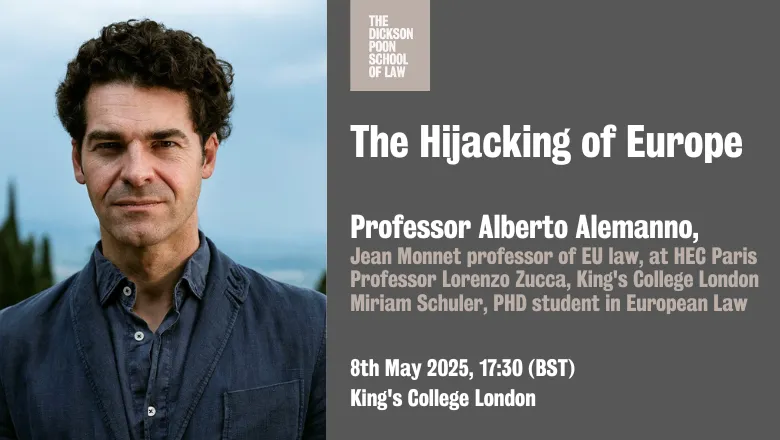The Hijacking of Europe

Don’t miss our seminar with Professor Alberto Alemanno, Jean Monnet Professor of EU Law at HEC Paris, as he unpacks how the European Union is evolving, often without the voice of its people.
The Hijacking of Europe
How Politicians Took the EU Away from its Citizens and How to Win it Back
After seventy years of unprecedented socioeconomic integration, the European Union continues to evolve through processes that largely neglect people’s input. This is by no means new. Yet the problem is only set to worsen. Amid the continent’s epochal transformations, the EU is expected to gain — not lose — power, thus increasing its influence over its citizens without offering them a corresponding expansion of democratic opportunities.
This paper intends first to explore the neglected historical and structural conditions that have hindered democratisation in the EU. It analyzes the role played by national political leaders, showing how they have systematically prevented the emergence of an EU-wide political competition — and genuine European political party system — capable of fostering a genuine transnational space for debate and dialogue across borders rather than within them. Secondly, the paper presents a set of proposals to overcome these structural obstacles to EU democratisation. These intend to restore and revamp the original democratisation dynamics expected from the politicisation of the EU by ensuring that, this time, they may transcend national borders.
Discussants
Professor Alberto Alemanno, Jean Monnet Professor of EU Law, at HEC Paris and College of Europe
Alberto Alemanno is the Jean Monnet Professor of European Union Law at HEC Paris, a visiting professor at the College of Europe in Bruges, and a Democracy Fellow at Harvard University. One of the leading voices on Europe’s democratization, his research and public interest work have been centred on how laws and policies may be used to improve people’s lives through the adoption of power-shifting reforms countering political, economic, and health disparities of access within society. He is a regular contributor to Le Monde, The Guardian, Project Syndicate, Bloomberg, and TV commentator on Euronews, and BBC World. His commitment to bridging the gap between academic research and policy action through his nonprofit The Good Lobby has earned Alemanno numerous recognitions, including Politico’s Power 40 (2023), Social Innovator of the Year Award by the Schwab Foundation (2022), Ashoka Fellow since 2019, and Young Global Leader by the World Economic Forum (2015).
Originally from Italy, Alberto graduated from Harvard Law School and the College of Europe and holds a PhD in International Law and Economics from Bocconi University.
Professor Lorenzo Zucca, King's College London
Lorenzo Zucca is Professor in Law & Philosophy. Lorenzo's special interests span from human rights law and philosophy to constitutional theory, with a focus on the relation between Church and State.
He's now working on a project entitled 'The Uncertainty of Will,' which explores Shakespeare's vision on the connection between power and knowledge and examines its psychological and philosophical insights on human cognition and human institutions.
He is the author of Constitutional Dilemmas- Conflicts of Fundamental Legal Rights in Europe and the USA (OUP, 2007) and numerous articles on human rights law and theory. His second monograph is entitled A Secular Europe: Law and Religion in the European Constitutional Landscape (OUP 2012). This is a study of one of the most pressing problems in Europe and includes issues such as the protection of religious freedom, the limits of religious toleration, and a wider debate on European identity.
Miriam Schuler, PHD student in European Law
Miriam Schuler is a PhD candidate in EU Law at the Dickson Poon School of Law, King’s College London. Her research focuses on the EU’s defence of democracy in and against the Member States, examining what democratic standards Member States must comply with as a matter of EU Law. Her research is funded by an AHRC London Arts and Humanities Partnership Studentship. Miriam has passed the First Legal State Examination in Berlin. She holds a Master in European Law from the Université Paris II Panthéon-Assas as well as a Master of Laws in Transnational Law from King’s College London.
Chair: Professor Oana Stefan, Director, Centre of European Law
Professor Oana Stefan is the Chair of European Law at King’s College London, and director of the Centre of European Law. She held permanent academic positions with HEC Paris, College of Europe, University College Dublin, and a number of visiting positions, including the Vincent Wright Chair at Sciences Po in Paris. She is a scholar of law and governance in the EU, having written on competition and state aid, energy law, financial regulation, health, and the rule of law. Oana Stefan co-led the EU funded Jean Monnet European Network on Soft Law Research which has empirically assessed the use of soft law by national administrations and courts in six countries and four legal fields. She published extensively on soft law including two monographs (Soft Law in Court, Kluwer 2013; EU Soft Law in the Member States, Hart 2021).
Please join us after as we host a drinks reception to discuss the topic and network.
Search for another event

